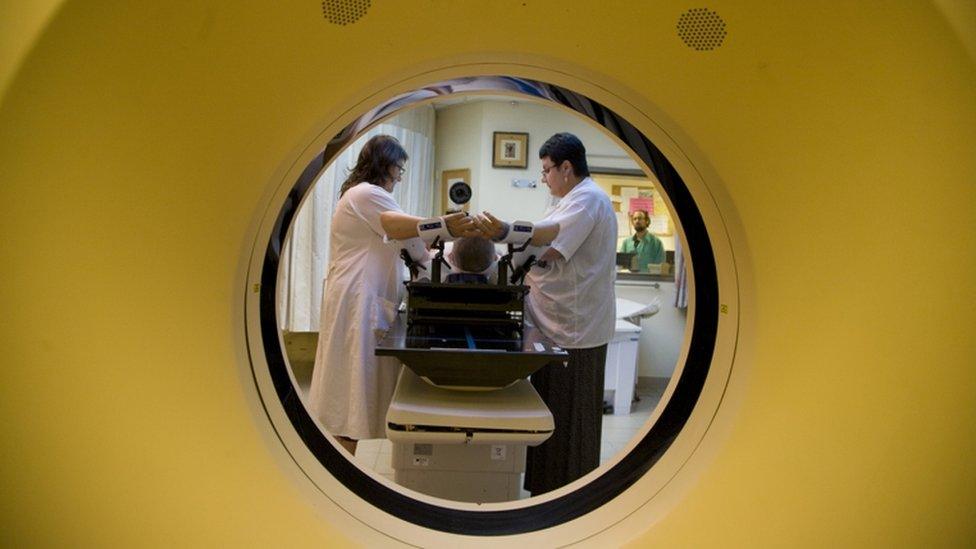'Cancer turned my world upside down'
- Published
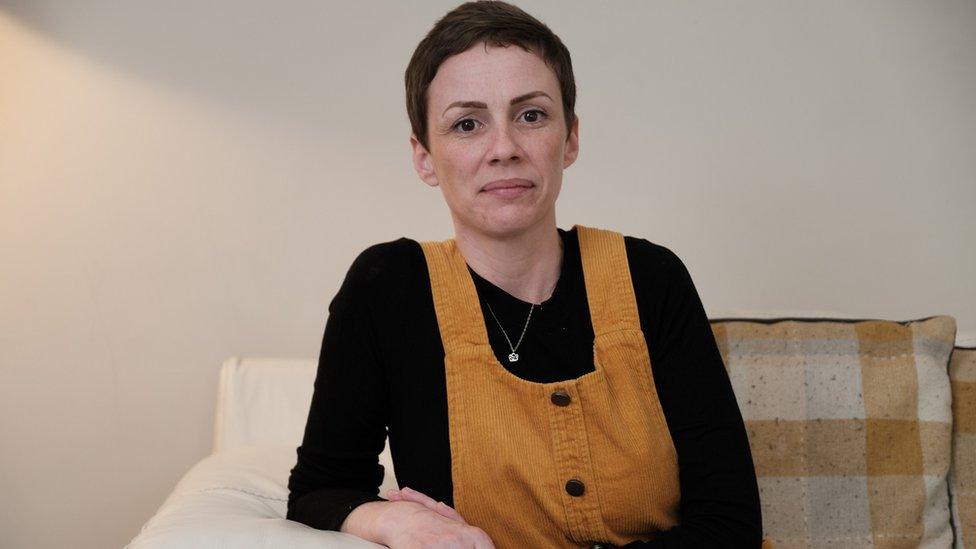
Pamela Harrower was diagnosed with cancer last year, aged 35.
When Pamela Harrower was treated for breast cancer, the care and treatment she received in hospital was "fantastic".
But after six months of gruelling chemotherapy and radiotherapy, the 36-year-old from Fife says she didn't get the mental health support she needed.
Her experience is reflected in a new report on experiences of Scottish cancer patients.
It found that the vast majority (95%) rated their cancer care positively.
The survey of 5,000 people also found 97% respondents said they were always treated with dignity and respect by healthcare professionals.
However, the Scottish Cancer Patient Experience Survey also reports that just over half (55%) of those surveyed received sufficient emotional and psychological support from medics.
Three in 10 people (31%) said they were supported to some extent, while 13% said they received no support at all.
The survey has been published by Scotland's Chief Statistician, external and was funded by the Scottish government and Macmillan Cancer Support.
It came on the day new figures revealed that more than 16,300 women and 15,800 men were diagnosed with cancer in 2017.
Pamela's story
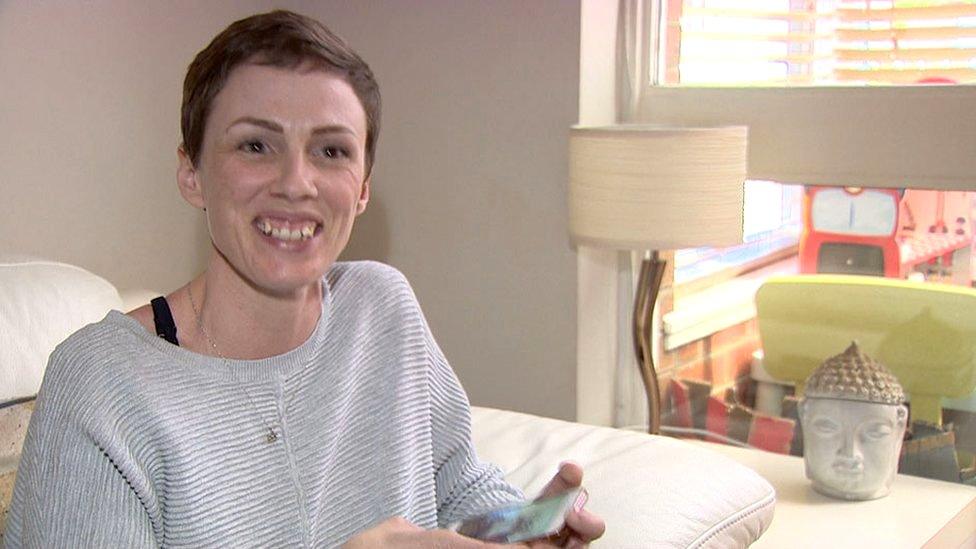
Pamela Harrower says she always faced treatment with a smile on her face
Pamela Harrower was left devastated when she was diagnosed with a rare form of breast cancer on 11 April last year.
"I didn't think it could happen to me - I was 35, probably the fittest I'd ever been in my life", she said.
"I found this tiny wee lump that absolutely turned by world upside down. I just kept thinking about my kids, my family, my husband."
She was determined to have a positive attitude and to approach her treatment with a smile on her face.
She said the medical treatment she received was "fantastic".
"All my treatments were planned amazingly, the staff in the hospital were fantastic," she added.
"But when you're on that treatment train, it's just so fast and I don't feel like you get enough support for your mental health."
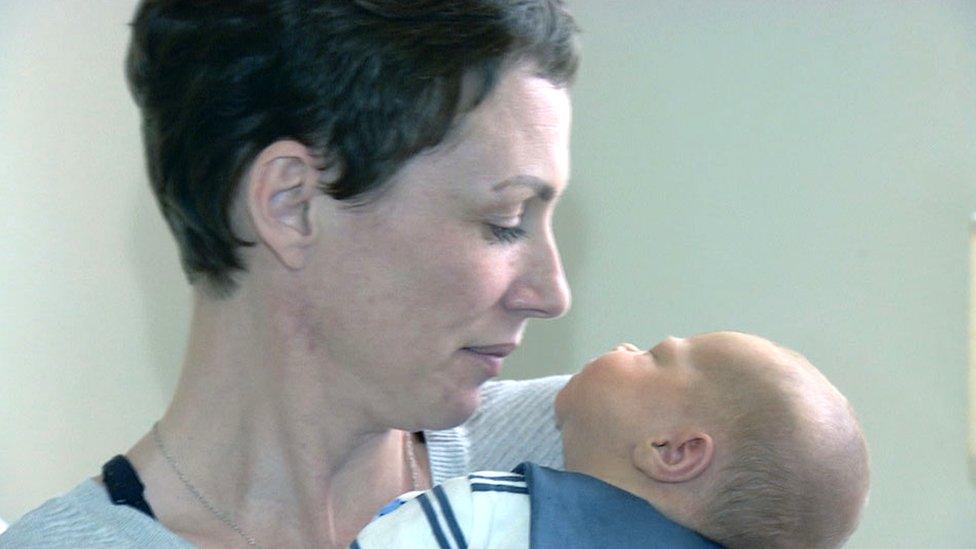
Pamela has recently become a grandmother
When Ms Harrower became quite ill while undergoing chemotherapy, her husband had to give up work - leading to some money worries for the family.
Macmillan Cancer Support helped them obtain the benefits they were entitled to - and also helped Ms Harrower identify the extra help she needed.
She took part in a survey about her financial, physical and mental health.
"I really found that helped me because I didn't realise how much help I was needing, mentally and physically," she said.
Now the charity has put her in touch with local support groups and classes to help her mentally recover from her treatment.
She said she wanted the Scottish government to invest more in supporting the mental health of cancer patients.
"Yes, your physical wellbeing is very important, but your mental health is just as important," she said.
"Your mind is the hardest battle. When you've got cancer you've got a physical thing you can fight, you can go to all your treatments, you can be determined, but when it's your mind you're battling with, it's very, very difficult."
What else was in the report?
About 5,000 people who were diagnosed with cancer in 2017 took part in the survey.
It asked people about their experiences of cancer care, from thinking something was wrong with them to the support they received after diagnosis and treatment.
The survey found:
Most people (86%) were told they had cancer in a sensitive way
Three in 10 people were not given any written information about the type of cancer they had when they were told they had the disease
Most people (87%) felt their treatment options were completely explained before treatment started
Of those who said they needed help from health or social services, 17% said they were not given enough care and support
One in two said they were definitely given enough care and support after their cancer treatment had finished
About 16% experienced difficulty travelling to appointments, the cost of travel and parking among the main concerns
A similar report published in 2016 found that patients who were given a care plan had a more positive experience of cancer care.
In fact, those who did not have a care plan were significantly more negative for 45 out of 47 questions in the earlier survey.
But the latest report found that 30% of respondents were given a care plan - up from 22% on the previous report.
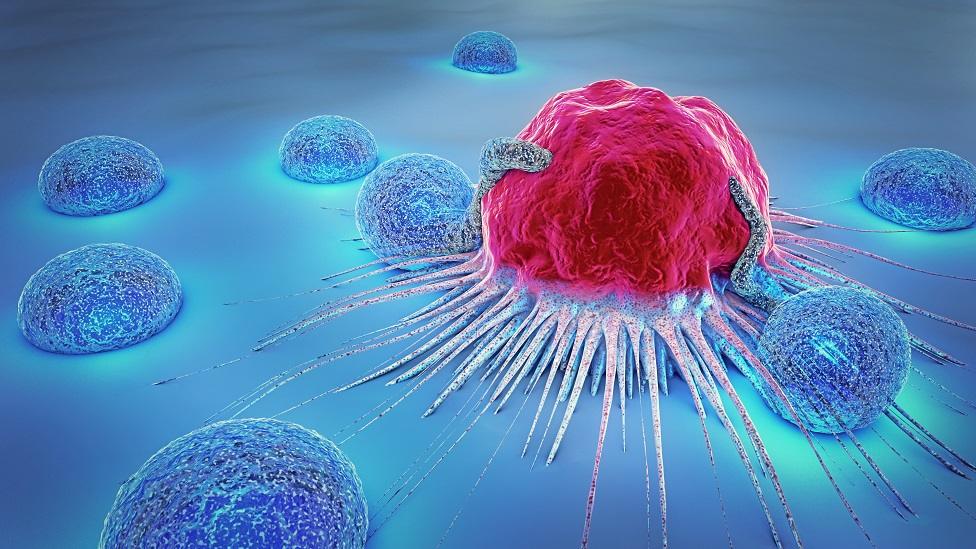
What does the Scottish government have to say?
Health Secretary Jeane Freeman said it was vital the government provided the best possible care to cancer patients.
"That's why patient feedback is crucial," she said.
"The results of this survey will support us in making further improvements in cancer care across Scotland and we will work to ensure all patients have the information they need about their treatment and support.
"Our £850m waiting times improvements plan will direct significant investment into substantial and sustainable improvements, including diagnostics, which is crucial for cancer care.
"I expect health boards to listen to what people with cancer are saying about what matters to them, and make improvements based on their views."
Janice Preston, head of Macmillan in Scotland, said the survey showed there had been areas of improvement since the last report.
She said: "However it's clear the emotional, practical and financial needs of many people are still not being met and that some people aren't receiving care plans, despite the positive impact we know they have on people's care."
- Published6 June 2016
